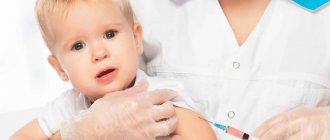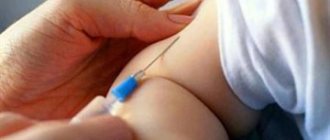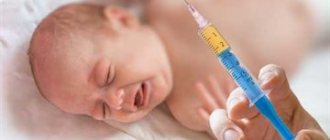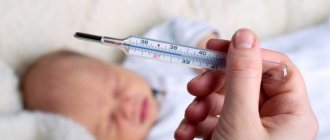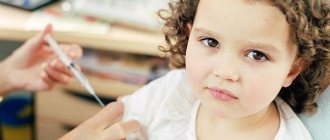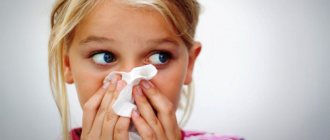Before you get vaccinated
Taking into account the fact that in the vast majority of cases, vaccinations are well tolerated by healthy children without any preparation or pre-treatment, the most important point in preparing a child for vaccination is to determine contraindications to vaccinations, that is, those cases of illness in a child in which vaccination can give serious adverse reactions. Contraindications and precautions for vaccination; in some cases, vaccination in children is either strictly prohibited or should be postponed to a later date. In order to correctly assess contraindications and precautions for vaccination in a child, it is important to follow the vaccination calendar and know in advance which vaccination should be given to the child and when. Before vaccinating your child and on the day of vaccination, read what contraindications and precautions are associated with the administration of a particular vaccination and make sure that the child does not have any contraindications for the vaccination. If you find it difficult to determine certain contraindications or precautions (for example, how dangerous a child’s cold or cough is), show it to your doctor. You should not blindly refuse vaccination because of a slight runny nose or cough - this will only disrupt the vaccination plan.
When can you get a massage after vaccination?
Parents of a newborn child should wait 5-7 days after vaccination . If at the end of this period the child does not have a fever and feels healthy, then you can return to massage.
If your child is already older, and his body has already recovered from the vaccination, then the massage course can be restored as early as 3-5 days.
DTP vaccination
After DTP vaccination, procedures can be resumed no earlier than 5 days after the baby’s vaccination, since it most often causes side effects and complications in patients, because contains weakened genes of three diseases: whooping cough, diphtheria and tetanus.
If, a week after the child’s vaccination, a lump remains at the injection site, but there are no other side effects, massage is allowed, but you should avoid massaging this area.
After the Mantoux test, there is no break in the massage; this is only relevant after vaccinations with BCG, DPT, vaccines against hepatitis, polio and others. However, it is advisable not to stimulate the vaccination site until the doctor has taken the indications.
Treatment of fever and prevention of allergies after vaccination
An increase in temperature is a normal reaction of the child’s body to a vaccination, which means that the immune system has responded to the vaccine and is beginning to develop immunity (however, the absence of an increased temperature after vaccination does not mean that the vaccination was ineffective). In the case of completely healthy children, the temperature should not be lowered after vaccination if it does not exceed 38.5C. In cases of a more significant increase in temperature, and also when the temperature remains at 38.5 C in the evening, the child should be given an antipyretic. To treat fever after vaccination, it is recommended to use Paracetamol. Aspirin should never be used as an antipyretic in children.
In the case of children with a tendency to febrile convulsions, treatment should be started when the temperature rises above 37.5 or the child should be given an antipyretic before the temperature appears, if so advised by the neurologist observing the child.
Prevention of allergic reactions after vaccinations is indicated only in the case of children prone to developing allergies. In such cases, it is recommended to use Suprastin or another antihistamine as prescribed by a doctor.
Komarovsky about DPT
Evgeny Komarovsky advises worried and doubtful parents to carefully read the issue, and advises those who are against vaccination in general to reconsider their views. Because DPT, according to the doctor, is a highly effective way to protect the baby from diseases dangerous to his health and the only reasonable choice for mothers and fathers.
In this video episode, Dr. Komarovsky will tell us everything he thinks about the need for DTP vaccination
Like any prevention, vaccination with adsorbed pertussis-diphtheria-tetanus vaccine requires some preparation and parental readiness for possible problems. However, they are completely surmountable, Komarovsky emphasizes, if you follow a certain algorithm of actions.
Taking the drug into account
First of all, parents should be aware of which manufacturer’s vaccine their child will be vaccinated with. Today there are many such drugs, they have their pros and cons, but there are no frankly bad vaccines on the pharmaceutical market at the moment. Parents are in no way able to influence the choice of vaccine, since the drug is delivered centrally to clinics. DTP vaccination, which is given free of charge.
Now let’s listen to Dr. Komarovsky on the topic of complications after vaccinations
However, mothers and fathers can go the other way and ask the pediatrician to vaccinate the baby with Tetracok and Infanrix; these drugs are expensive, and such vaccination is done exclusively at the expense of the parents. Komarovsky, based on personal experience, claims that there are many children who get whooping cough after a timely DTP. However, in his practice, there were only isolated cases of this disease in children vaccinated with Infanrix or Tetrakok.
The reaction to Tetrakok is sometimes stronger than after DPT. Infanrix is much better tolerated by most children. Komarovsky does not exclude the use of Pentaxim; additional biological products against polio have been introduced into the composition of this vaccine.
Baby's health status
At the time of vaccination, the child must be completely healthy. It is for this reason that the baby is always examined by a pediatrician before the injection. But the doctor sees your child less often and less than the parents, and therefore careful observations of the child’s condition by mom and dad will help the doctor decide whether the right time has come to administer the vaccine.
Treatment of redness and swelling at the injection site
Most vaccinations result in more or less severe redness or swelling at the injection site. The most severe local reaction to vaccination is observed in the case of DTP (redness, swelling and pain at the injection site) and BCG (formation of a long-lasting non-healing ulcer). For all types of vaccinations, it is recommended to avoid any local treatment for redness or swelling at the injection site. If the child scratches the injection site, it can be covered with a light gauze bandage. At the site of the DTP, a compaction often forms, located deep in the muscle - a “bump”. Often such a lump is painful, and the child easily limps on one leg (if the vaccine was injected into the thigh). The formation of a dense “bump” after DPT is considered a normal reaction and does not require any treatment. Within a few weeks, the lump will resolve on its own.
What is the reaction when receiving a hepatitis vaccination in the 1st month?
According to some parents, a hepatitis vaccine at 1 month, the reaction to which can be unpredictable, is not necessary.
Therefore, they do their best to prevent their child from being vaccinated. This is due to the fact that a lot of information is published in open sources about the negative consequences of vaccinations against hepatitis B. But do not forget that thanks to universal vaccination, there are no epidemics of infectious diseases that are life-threatening in the country. Therefore, you should rely on common sense, and not on what is written on the World Wide Web.
How necessary is vaccination?
Hepatitis B is a viral disease that is widespread among the population.
To reduce the incidence, the hepatitis B vaccine is used, which leads to the body not accepting the infection.
Vaccinations are also given against another type of hepatitis - A. It is also of viral origin. This type of hepatitis is called the disease of dirty hands, since its transmission route is through household contacts. Hepatitis B can only be contracted through blood. A tiny drop of infected blood is enough to cause infection. The virus does not die even if the blood dries out.
Hepatitis A is not a dangerous disease that responds well to treatment. But hepatitis B is very dangerous, as it can lead to cirrhosis and liver cancer.
Any vaccination for a child or adult is currently not mandatory. Hepatitis is no exception. The patient decides whether to vaccinate or not. Doctors can only advise, but they have no right to insist.
However, there is a certain number of people who must be vaccinated. These are those who are at risk of infection. For example, employees of medical institutions. Since 2002, vaccination against hepatitis B has been mandatory for children.
In recent years, there has been a debate about whether children need vaccinations at all. There are both supporters and opponents of vaccination. But the second group most often includes people who are far from medicine, biology and virology.
Hepatitis B in children
In infants, the disease in the initial stage of its development manifests itself with symptoms reminiscent of acute respiratory infections. But gradually they are changing. The skin begins to turn yellow, nausea and vomiting appear, urine becomes dark, and appetite decreases. The child's temperature rises.
At the beginning of the disease, symptoms may not be observed. This may prevent the doctor from suspecting the disease at an early stage and making a diagnosis.
The disease lasts for a month and often ends in recovery. But it happens that the development of hepatitis becomes lightning fast, and in such situations death occurs in 90% of all cases. There is a risk of the disease becoming chronic, which can later lead to cancer or cirrhosis of the liver. Chronic hepatitis is more common in children than in adults. Therefore, only vaccination can protect them from a dangerous disease.
Infection of adults and children with hepatitis B is possible in different situations. It can be:
- contact with the blood of sick people;
- the process of blood transfusion, which is used during surgery;
- period of childbirth (transmission of the virus from mother to baby is possible);
- sexual contact with an infected partner;
- close household contacts with a sick person.
There is no need to be afraid of infection after vaccination against hepatitis.
How children are vaccinated
Russian doctors vaccinate children according to a standard schedule consisting of 3 injections. The first 2 vaccinations are initial, the third enhances the production of antibodies. It guarantees protection against the disease for several years.
The baby's first vaccination is given in the maternity hospital - within 12 to 24 hours from the moment of birth. The next vaccination is carried out exactly 1 month after the first. The third is done 6 months after the first.
If a child was born to an infected mother, doctors use a different vaccination regimen. Such children receive 4 vaccinations instead of 3. This allows you to protect your baby from dangerous diseases.
To avoid various reactions to the hepatitis vaccine, parents should be aware that there are some factors that require special caution when using the vaccine:
- yeast allergy;
- allergic reaction to the first shot in the vaccination regimen;
- infectious disease in the baby at the time of vaccination.
Different types of vaccines are used. In Russia it is allowed to use 6 products of domestic and foreign production. In terms of their composition, they are almost identical. To minimize the likelihood of adverse reactions, it is recommended to use one type of vaccinating agent throughout the entire vaccination regimen. But this is not a prerequisite. If necessary, you can use drugs from different manufacturers.
Side effects from vaccinations are standard; they are observed in approximately 10% of children. Currently, vaccination is the only way to protect children from a dangerous disease - hepatitis B.
Most of them tolerate vaccination quite well, so you should not avoid vaccinations.
What complications are possible?
After receiving the vaccine, the child may have adverse reactions. But this doesn't happen often. The main complications after hepatitis vaccination are as follows:
- slight redness or thickening of the skin in the place where the drug was injected;
- temperature after vaccination (it can reach 38.5 degrees);
- weakness and rapid fatigue of the baby;
- pain in the joints;
- headache and dizziness;
- nausea;
- in rare cases, an allergic reaction of the body.
Precautions during the post-vaccination period
One of the famous pediatricians, Dr. Komarovsky, in his programs and articles, covers in detail the topic of childhood vaccinations and talks about the necessary actions after vaccination:
- monitor the child’s nutrition and avoid overfeeding;
- ensure active consumption of fluids (water, juices, compote, tea);
- Walk more with your child in the fresh air and regularly ventilate the room;
- limit the baby from contact with a large number of people so that his weakened body is not exposed to germs;
- when the temperature rises, use Paracetamol, but do not overdo it. A slight increase is a normal reaction to the vaccine;
- Coordinate with your doctor the use of antiallergic medications. This is especially true after the DPT vaccine;
- If alarming symptoms or a strong increase in temperature occur, immediately seek the help of a pediatrician.
If all of the above points are observed, the child’s body will not suffer from unnecessary overload and will be able to cope with the consequences of the administered vaccine for 3-5 days, after which it will be possible to resume massage sessions and light physical activity. It is not advisable to combine these actions to prevent side effects.
Before the session, experienced and qualified massage therapists must inquire about the child’s condition and how many days have passed since the vaccination.
